GHR611: HRM Strategies: Expatriate Selection at Hilton Hotel Australia
VerifiedAdded on 2023/04/07
|20
|3824
|178
Report
AI Summary
This report analyzes the global human resources management practices at Hilton Hotel, Australia, focusing on expatriate selection processes, training programs, recruitment methods, and performance appraisal systems. It evaluates the criteria for expatriate selection, emphasizing the importance of cross-cultural skills and adaptability alongside technical competencies. The report also discusses various approaches to staffing, including ethnocentric, polycentric, geocentric, and regiocentric approaches, and their implications for international operations. Furthermore, it examines the challenges and considerations in performance appraisal within a global context, highlighting the need for culturally sensitive evaluation criteria and evaluator selection. The analysis is supplemented by case studies that illustrate the practical application of these concepts within Hilton Hotel's international operations. Desklib provides access to this report and many other solved assignments for students.
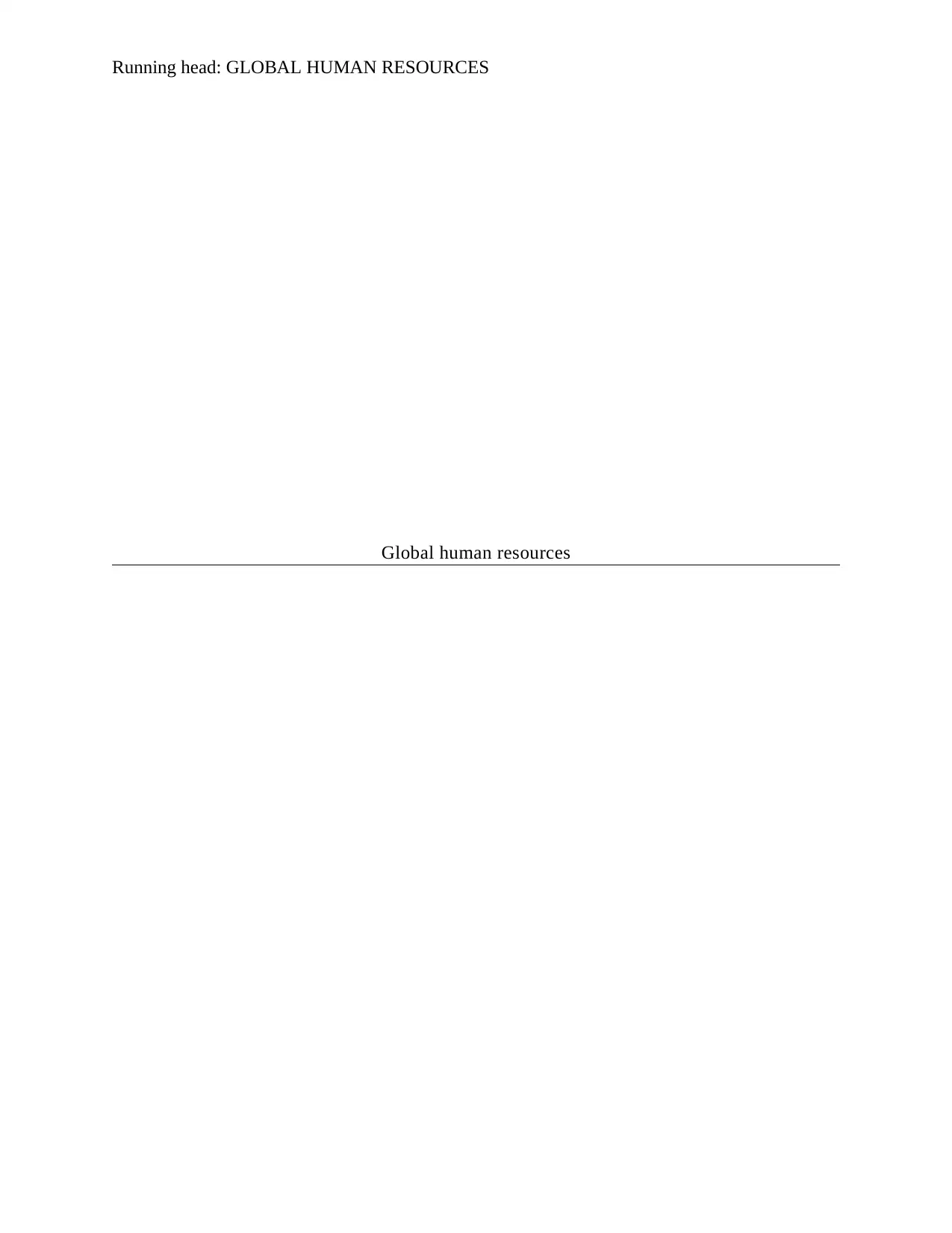
Running head: GLOBAL HUMAN RESOURCES
Global human resources
Global human resources
Paraphrase This Document
Need a fresh take? Get an instant paraphrase of this document with our AI Paraphraser
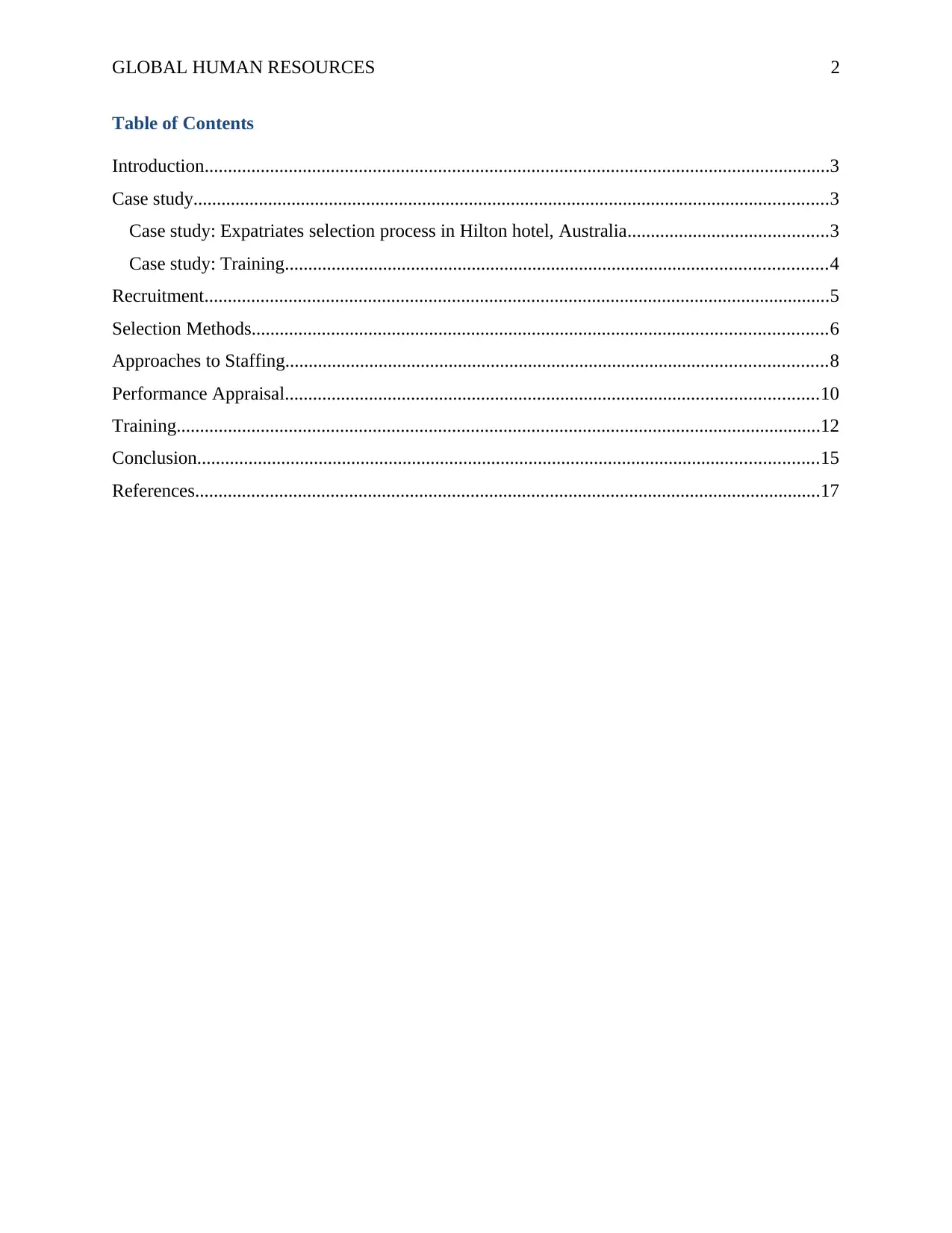
GLOBAL HUMAN RESOURCES 2
Table of Contents
Introduction......................................................................................................................................3
Case study........................................................................................................................................3
Case study: Expatriates selection process in Hilton hotel, Australia...........................................3
Case study: Training....................................................................................................................4
Recruitment......................................................................................................................................5
Selection Methods...........................................................................................................................6
Approaches to Staffing....................................................................................................................8
Performance Appraisal..................................................................................................................10
Training..........................................................................................................................................12
Conclusion.....................................................................................................................................15
References......................................................................................................................................17
Table of Contents
Introduction......................................................................................................................................3
Case study........................................................................................................................................3
Case study: Expatriates selection process in Hilton hotel, Australia...........................................3
Case study: Training....................................................................................................................4
Recruitment......................................................................................................................................5
Selection Methods...........................................................................................................................6
Approaches to Staffing....................................................................................................................8
Performance Appraisal..................................................................................................................10
Training..........................................................................................................................................12
Conclusion.....................................................................................................................................15
References......................................................................................................................................17
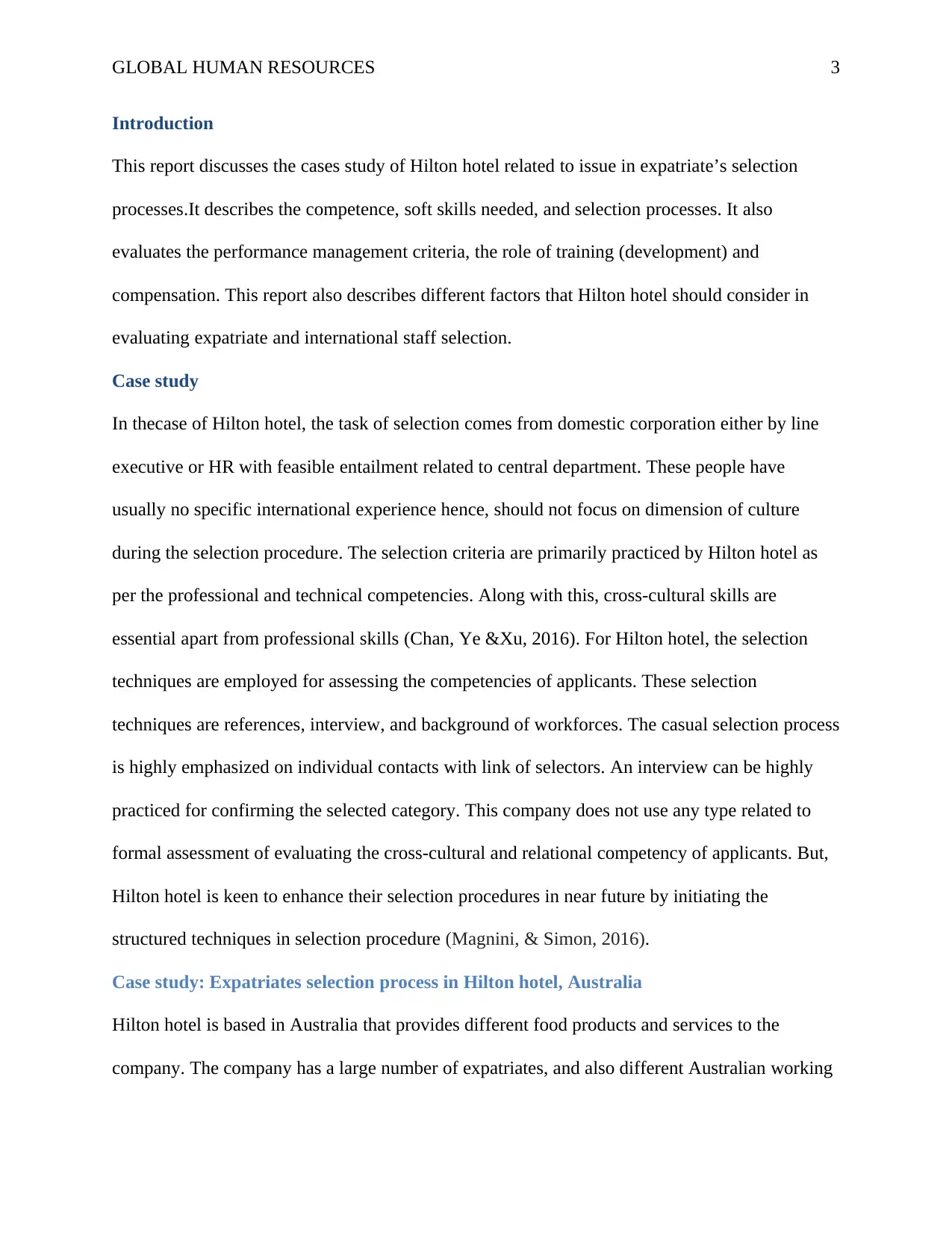
GLOBAL HUMAN RESOURCES 3
Introduction
This report discusses the cases study of Hilton hotel related to issue in expatriate’s selection
processes.It describes the competence, soft skills needed, and selection processes. It also
evaluates the performance management criteria, the role of training (development) and
compensation. This report also describes different factors that Hilton hotel should consider in
evaluating expatriate and international staff selection.
Case study
In thecase of Hilton hotel, the task of selection comes from domestic corporation either by line
executive or HR with feasible entailment related to central department. These people have
usually no specific international experience hence, should not focus on dimension of culture
during the selection procedure. The selection criteria are primarily practiced by Hilton hotel as
per the professional and technical competencies. Along with this, cross-cultural skills are
essential apart from professional skills (Chan, Ye &Xu, 2016). For Hilton hotel, the selection
techniques are employed for assessing the competencies of applicants. These selection
techniques are references, interview, and background of workforces. The casual selection process
is highly emphasized on individual contacts with link of selectors. An interview can be highly
practiced for confirming the selected category. This company does not use any type related to
formal assessment of evaluating the cross-cultural and relational competency of applicants. But,
Hilton hotel is keen to enhance their selection procedures in near future by initiating the
structured techniques in selection procedure (Magnini, & Simon, 2016).
Case study: Expatriates selection process in Hilton hotel, Australia
Hilton hotel is based in Australia that provides different food products and services to the
company. The company has a large number of expatriates, and also different Australian working
Introduction
This report discusses the cases study of Hilton hotel related to issue in expatriate’s selection
processes.It describes the competence, soft skills needed, and selection processes. It also
evaluates the performance management criteria, the role of training (development) and
compensation. This report also describes different factors that Hilton hotel should consider in
evaluating expatriate and international staff selection.
Case study
In thecase of Hilton hotel, the task of selection comes from domestic corporation either by line
executive or HR with feasible entailment related to central department. These people have
usually no specific international experience hence, should not focus on dimension of culture
during the selection procedure. The selection criteria are primarily practiced by Hilton hotel as
per the professional and technical competencies. Along with this, cross-cultural skills are
essential apart from professional skills (Chan, Ye &Xu, 2016). For Hilton hotel, the selection
techniques are employed for assessing the competencies of applicants. These selection
techniques are references, interview, and background of workforces. The casual selection process
is highly emphasized on individual contacts with link of selectors. An interview can be highly
practiced for confirming the selected category. This company does not use any type related to
formal assessment of evaluating the cross-cultural and relational competency of applicants. But,
Hilton hotel is keen to enhance their selection procedures in near future by initiating the
structured techniques in selection procedure (Magnini, & Simon, 2016).
Case study: Expatriates selection process in Hilton hotel, Australia
Hilton hotel is based in Australia that provides different food products and services to the
company. The company has a large number of expatriates, and also different Australian working
⊘ This is a preview!⊘
Do you want full access?
Subscribe today to unlock all pages.

Trusted by 1+ million students worldwide
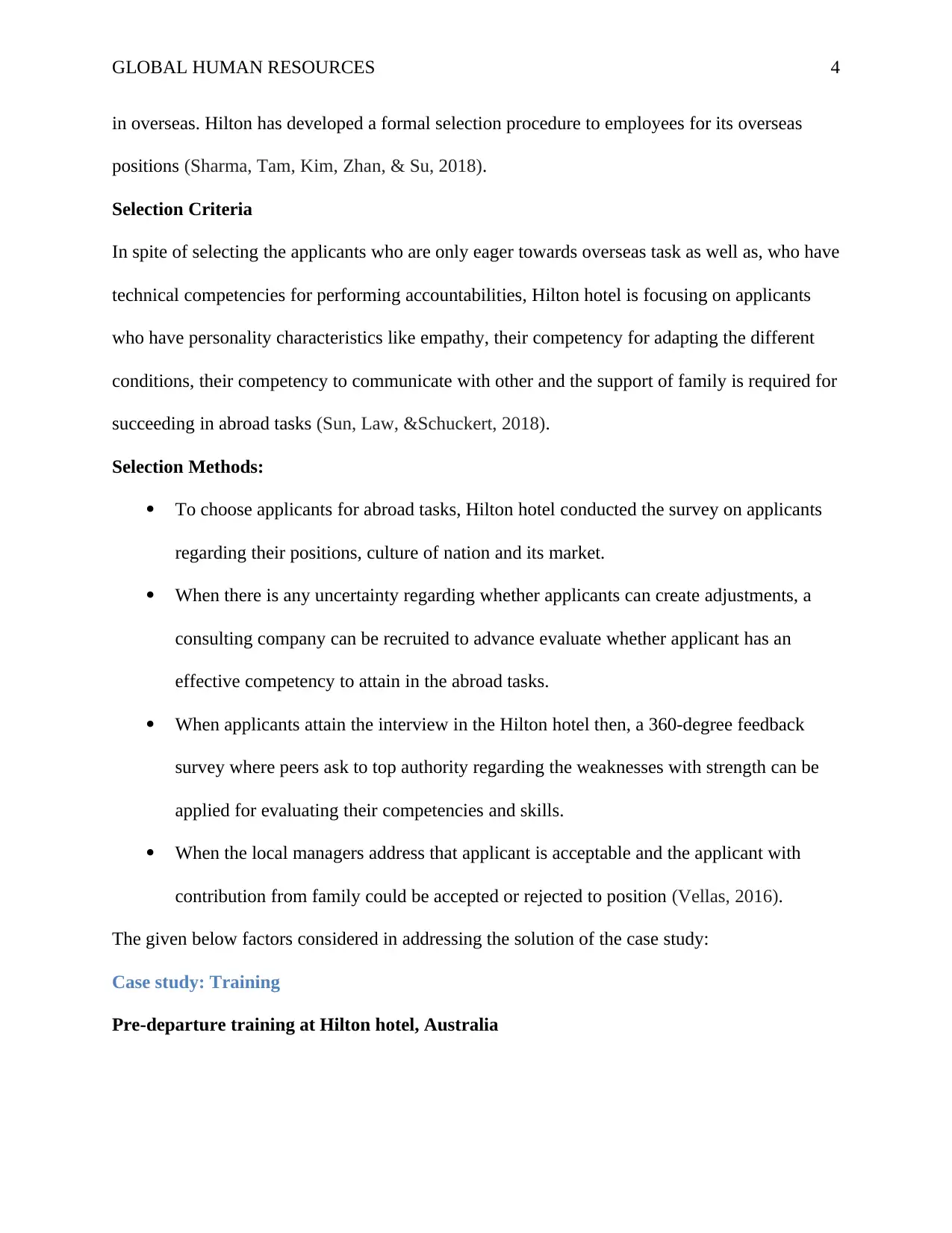
GLOBAL HUMAN RESOURCES 4
in overseas. Hilton has developed a formal selection procedure to employees for its overseas
positions (Sharma, Tam, Kim, Zhan, & Su, 2018).
Selection Criteria
In spite of selecting the applicants who are only eager towards overseas task as well as, who have
technical competencies for performing accountabilities, Hilton hotel is focusing on applicants
who have personality characteristics like empathy, their competency for adapting the different
conditions, their competency to communicate with other and the support of family is required for
succeeding in abroad tasks (Sun, Law, &Schuckert, 2018).
Selection Methods:
To choose applicants for abroad tasks, Hilton hotel conducted the survey on applicants
regarding their positions, culture of nation and its market.
When there is any uncertainty regarding whether applicants can create adjustments, a
consulting company can be recruited to advance evaluate whether applicant has an
effective competency to attain in the abroad tasks.
When applicants attain the interview in the Hilton hotel then, a 360-degree feedback
survey where peers ask to top authority regarding the weaknesses with strength can be
applied for evaluating their competencies and skills.
When the local managers address that applicant is acceptable and the applicant with
contribution from family could be accepted or rejected to position (Vellas, 2016).
The given below factors considered in addressing the solution of the case study:
Case study: Training
Pre-departure training at Hilton hotel, Australia
in overseas. Hilton has developed a formal selection procedure to employees for its overseas
positions (Sharma, Tam, Kim, Zhan, & Su, 2018).
Selection Criteria
In spite of selecting the applicants who are only eager towards overseas task as well as, who have
technical competencies for performing accountabilities, Hilton hotel is focusing on applicants
who have personality characteristics like empathy, their competency for adapting the different
conditions, their competency to communicate with other and the support of family is required for
succeeding in abroad tasks (Sun, Law, &Schuckert, 2018).
Selection Methods:
To choose applicants for abroad tasks, Hilton hotel conducted the survey on applicants
regarding their positions, culture of nation and its market.
When there is any uncertainty regarding whether applicants can create adjustments, a
consulting company can be recruited to advance evaluate whether applicant has an
effective competency to attain in the abroad tasks.
When applicants attain the interview in the Hilton hotel then, a 360-degree feedback
survey where peers ask to top authority regarding the weaknesses with strength can be
applied for evaluating their competencies and skills.
When the local managers address that applicant is acceptable and the applicant with
contribution from family could be accepted or rejected to position (Vellas, 2016).
The given below factors considered in addressing the solution of the case study:
Case study: Training
Pre-departure training at Hilton hotel, Australia
Paraphrase This Document
Need a fresh take? Get an instant paraphrase of this document with our AI Paraphraser
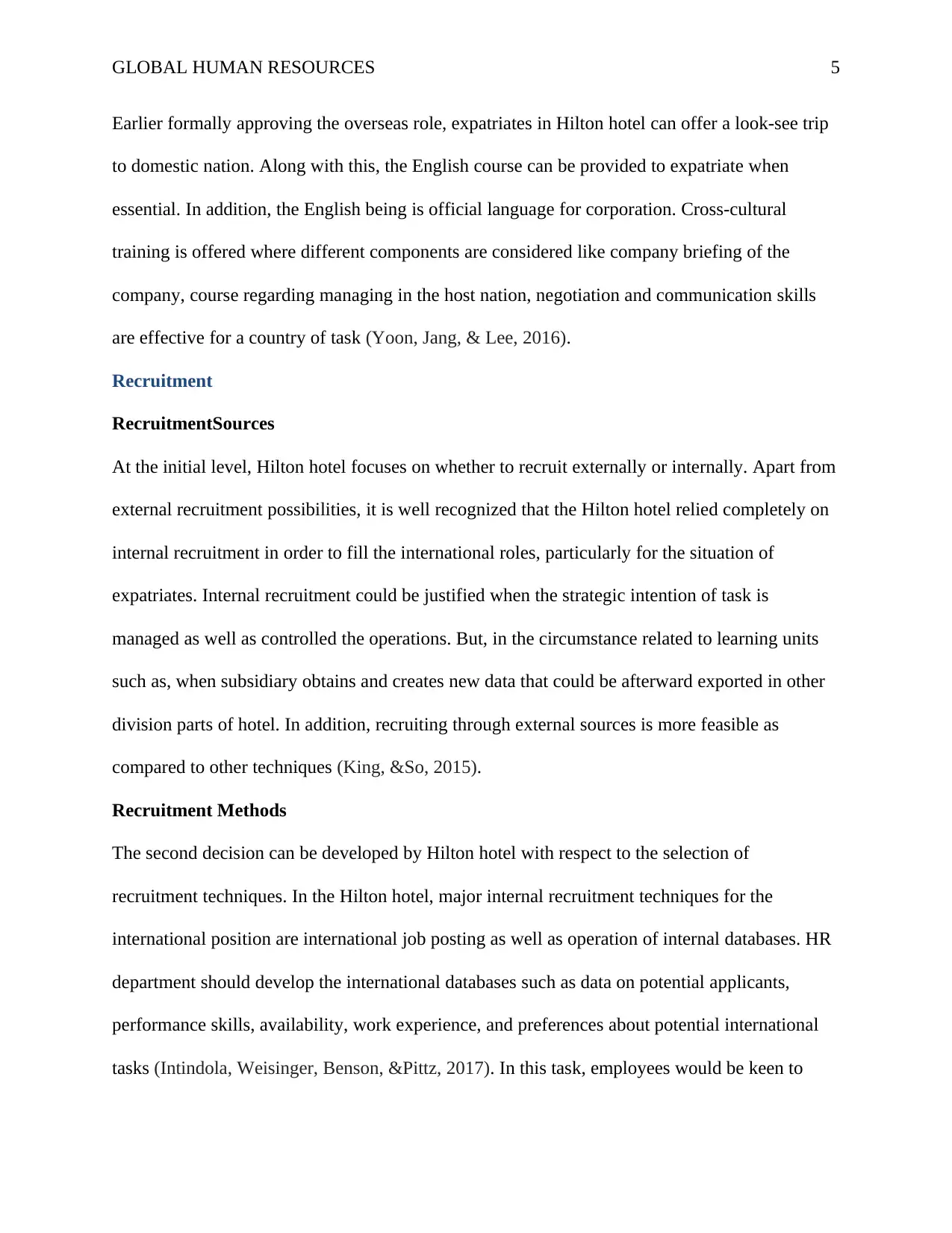
GLOBAL HUMAN RESOURCES 5
Earlier formally approving the overseas role, expatriates in Hilton hotel can offer a look-see trip
to domestic nation. Along with this, the English course can be provided to expatriate when
essential. In addition, the English being is official language for corporation. Cross-cultural
training is offered where different components are considered like company briefing of the
company, course regarding managing in the host nation, negotiation and communication skills
are effective for a country of task (Yoon, Jang, & Lee, 2016).
Recruitment
RecruitmentSources
At the initial level, Hilton hotel focuses on whether to recruit externally or internally. Apart from
external recruitment possibilities, it is well recognized that the Hilton hotel relied completely on
internal recruitment in order to fill the international roles, particularly for the situation of
expatriates. Internal recruitment could be justified when the strategic intention of task is
managed as well as controlled the operations. But, in the circumstance related to learning units
such as, when subsidiary obtains and creates new data that could be afterward exported in other
division parts of hotel. In addition, recruiting through external sources is more feasible as
compared to other techniques (King, &So, 2015).
Recruitment Methods
The second decision can be developed by Hilton hotel with respect to the selection of
recruitment techniques. In the Hilton hotel, major internal recruitment techniques for the
international position are international job posting as well as operation of internal databases. HR
department should develop the international databases such as data on potential applicants,
performance skills, availability, work experience, and preferences about potential international
tasks (Intindola, Weisinger, Benson, &Pittz, 2017). In this task, employees would be keen to
Earlier formally approving the overseas role, expatriates in Hilton hotel can offer a look-see trip
to domestic nation. Along with this, the English course can be provided to expatriate when
essential. In addition, the English being is official language for corporation. Cross-cultural
training is offered where different components are considered like company briefing of the
company, course regarding managing in the host nation, negotiation and communication skills
are effective for a country of task (Yoon, Jang, & Lee, 2016).
Recruitment
RecruitmentSources
At the initial level, Hilton hotel focuses on whether to recruit externally or internally. Apart from
external recruitment possibilities, it is well recognized that the Hilton hotel relied completely on
internal recruitment in order to fill the international roles, particularly for the situation of
expatriates. Internal recruitment could be justified when the strategic intention of task is
managed as well as controlled the operations. But, in the circumstance related to learning units
such as, when subsidiary obtains and creates new data that could be afterward exported in other
division parts of hotel. In addition, recruiting through external sources is more feasible as
compared to other techniques (King, &So, 2015).
Recruitment Methods
The second decision can be developed by Hilton hotel with respect to the selection of
recruitment techniques. In the Hilton hotel, major internal recruitment techniques for the
international position are international job posting as well as operation of internal databases. HR
department should develop the international databases such as data on potential applicants,
performance skills, availability, work experience, and preferences about potential international
tasks (Intindola, Weisinger, Benson, &Pittz, 2017). In this task, employees would be keen to
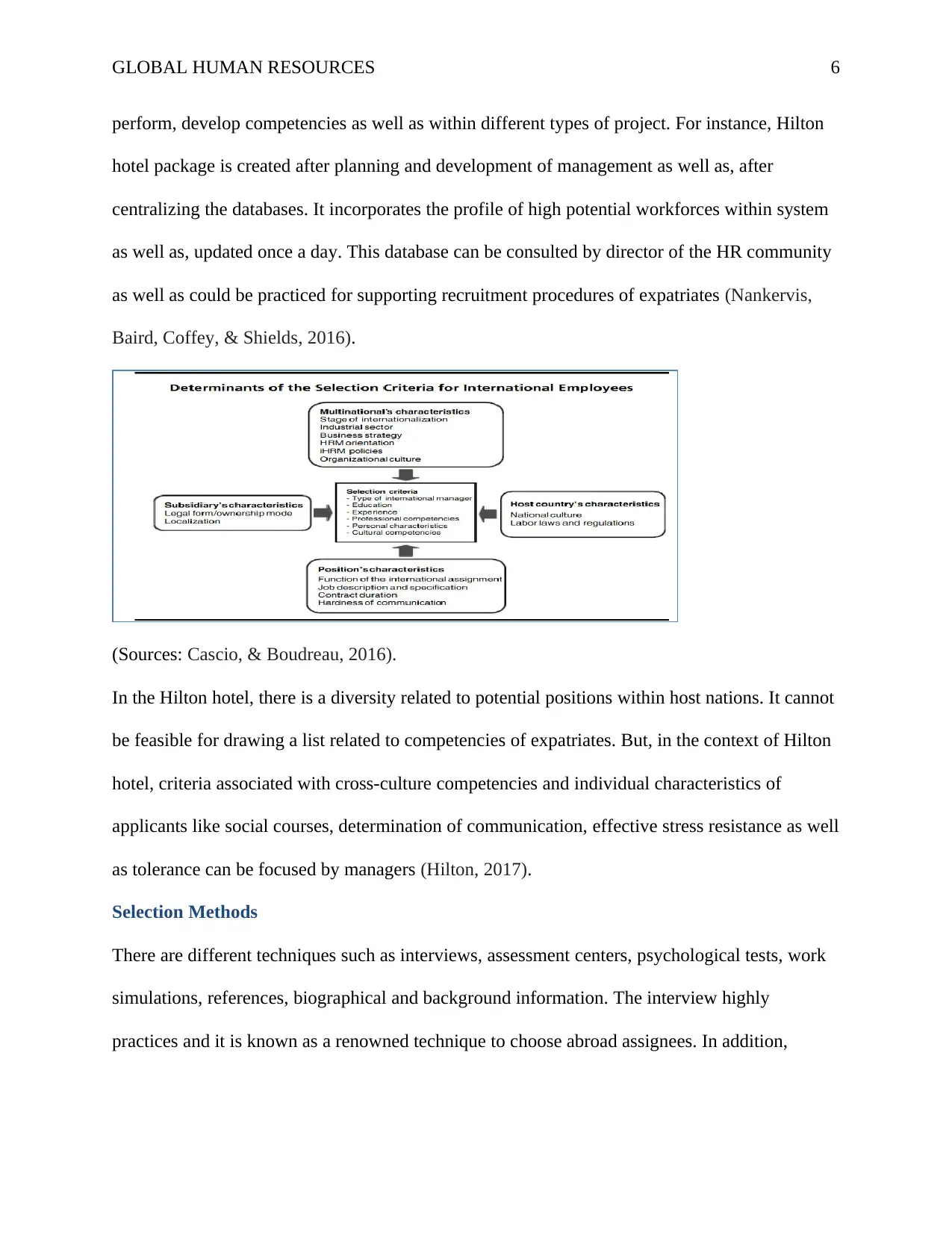
GLOBAL HUMAN RESOURCES 6
perform, develop competencies as well as within different types of project. For instance, Hilton
hotel package is created after planning and development of management as well as, after
centralizing the databases. It incorporates the profile of high potential workforces within system
as well as, updated once a day. This database can be consulted by director of the HR community
as well as could be practiced for supporting recruitment procedures of expatriates (Nankervis,
Baird, Coffey, & Shields, 2016).
(Sources: Cascio, & Boudreau, 2016).
In the Hilton hotel, there is a diversity related to potential positions within host nations. It cannot
be feasible for drawing a list related to competencies of expatriates. But, in the context of Hilton
hotel, criteria associated with cross-culture competencies and individual characteristics of
applicants like social courses, determination of communication, effective stress resistance as well
as tolerance can be focused by managers (Hilton, 2017).
Selection Methods
There are different techniques such as interviews, assessment centers, psychological tests, work
simulations, references, biographical and background information. The interview highly
practices and it is known as a renowned technique to choose abroad assignees. In addition,
perform, develop competencies as well as within different types of project. For instance, Hilton
hotel package is created after planning and development of management as well as, after
centralizing the databases. It incorporates the profile of high potential workforces within system
as well as, updated once a day. This database can be consulted by director of the HR community
as well as could be practiced for supporting recruitment procedures of expatriates (Nankervis,
Baird, Coffey, & Shields, 2016).
(Sources: Cascio, & Boudreau, 2016).
In the Hilton hotel, there is a diversity related to potential positions within host nations. It cannot
be feasible for drawing a list related to competencies of expatriates. But, in the context of Hilton
hotel, criteria associated with cross-culture competencies and individual characteristics of
applicants like social courses, determination of communication, effective stress resistance as well
as tolerance can be focused by managers (Hilton, 2017).
Selection Methods
There are different techniques such as interviews, assessment centers, psychological tests, work
simulations, references, biographical and background information. The interview highly
practices and it is known as a renowned technique to choose abroad assignees. In addition,
⊘ This is a preview!⊘
Do you want full access?
Subscribe today to unlock all pages.

Trusted by 1+ million students worldwide
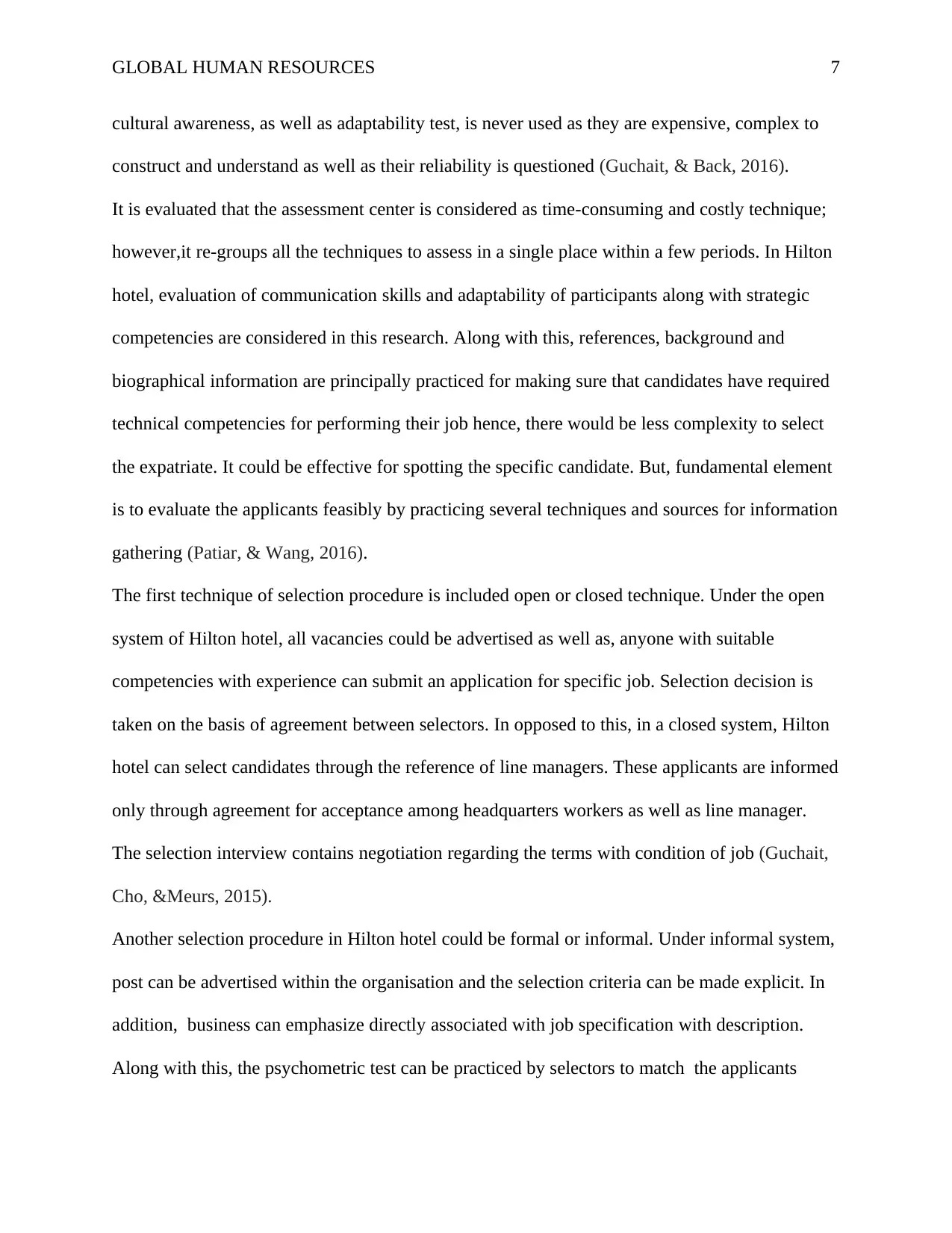
GLOBAL HUMAN RESOURCES 7
cultural awareness, as well as adaptability test, is never used as they are expensive, complex to
construct and understand as well as their reliability is questioned (Guchait, & Back, 2016).
It is evaluated that the assessment center is considered as time-consuming and costly technique;
however,it re-groups all the techniques to assess in a single place within a few periods. In Hilton
hotel, evaluation of communication skills and adaptability of participants along with strategic
competencies are considered in this research. Along with this, references, background and
biographical information are principally practiced for making sure that candidates have required
technical competencies for performing their job hence, there would be less complexity to select
the expatriate. It could be effective for spotting the specific candidate. But, fundamental element
is to evaluate the applicants feasibly by practicing several techniques and sources for information
gathering (Patiar, & Wang, 2016).
The first technique of selection procedure is included open or closed technique. Under the open
system of Hilton hotel, all vacancies could be advertised as well as, anyone with suitable
competencies with experience can submit an application for specific job. Selection decision is
taken on the basis of agreement between selectors. In opposed to this, in a closed system, Hilton
hotel can select candidates through the reference of line managers. These applicants are informed
only through agreement for acceptance among headquarters workers as well as line manager.
The selection interview contains negotiation regarding the terms with condition of job (Guchait,
Cho, &Meurs, 2015).
Another selection procedure in Hilton hotel could be formal or informal. Under informal system,
post can be advertised within the organisation and the selection criteria can be made explicit. In
addition, business can emphasize directly associated with job specification with description.
Along with this, the psychometric test can be practiced by selectors to match the applicants
cultural awareness, as well as adaptability test, is never used as they are expensive, complex to
construct and understand as well as their reliability is questioned (Guchait, & Back, 2016).
It is evaluated that the assessment center is considered as time-consuming and costly technique;
however,it re-groups all the techniques to assess in a single place within a few periods. In Hilton
hotel, evaluation of communication skills and adaptability of participants along with strategic
competencies are considered in this research. Along with this, references, background and
biographical information are principally practiced for making sure that candidates have required
technical competencies for performing their job hence, there would be less complexity to select
the expatriate. It could be effective for spotting the specific candidate. But, fundamental element
is to evaluate the applicants feasibly by practicing several techniques and sources for information
gathering (Patiar, & Wang, 2016).
The first technique of selection procedure is included open or closed technique. Under the open
system of Hilton hotel, all vacancies could be advertised as well as, anyone with suitable
competencies with experience can submit an application for specific job. Selection decision is
taken on the basis of agreement between selectors. In opposed to this, in a closed system, Hilton
hotel can select candidates through the reference of line managers. These applicants are informed
only through agreement for acceptance among headquarters workers as well as line manager.
The selection interview contains negotiation regarding the terms with condition of job (Guchait,
Cho, &Meurs, 2015).
Another selection procedure in Hilton hotel could be formal or informal. Under informal system,
post can be advertised within the organisation and the selection criteria can be made explicit. In
addition, business can emphasize directly associated with job specification with description.
Along with this, the psychometric test can be practiced by selectors to match the applicants
Paraphrase This Document
Need a fresh take? Get an instant paraphrase of this document with our AI Paraphraser
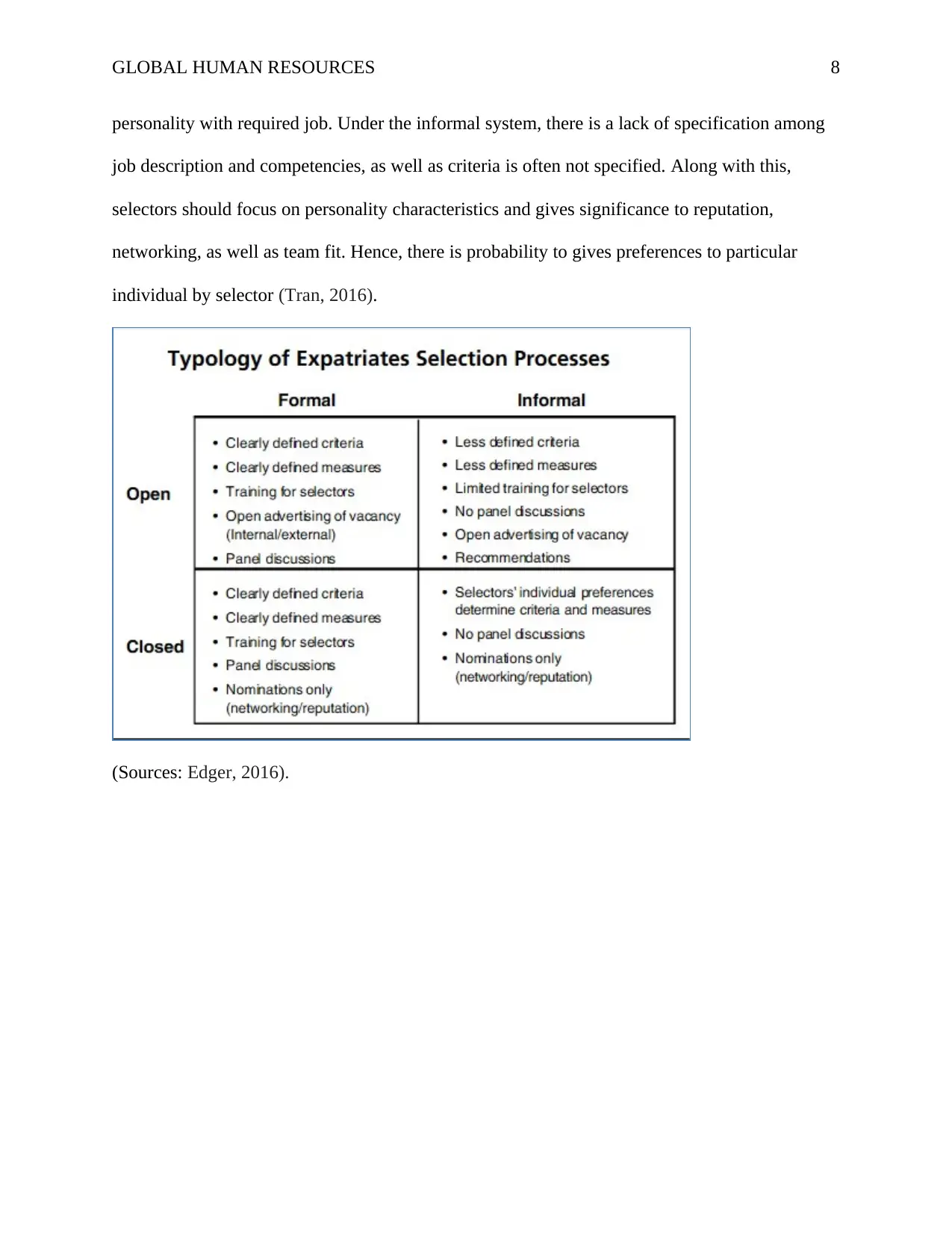
GLOBAL HUMAN RESOURCES 8
personality with required job. Under the informal system, there is a lack of specification among
job description and competencies, as well as criteria is often not specified. Along with this,
selectors should focus on personality characteristics and gives significance to reputation,
networking, as well as team fit. Hence, there is probability to gives preferences to particular
individual by selector (Tran, 2016).
(Sources: Edger, 2016).
personality with required job. Under the informal system, there is a lack of specification among
job description and competencies, as well as criteria is often not specified. Along with this,
selectors should focus on personality characteristics and gives significance to reputation,
networking, as well as team fit. Hence, there is probability to gives preferences to particular
individual by selector (Tran, 2016).
(Sources: Edger, 2016).
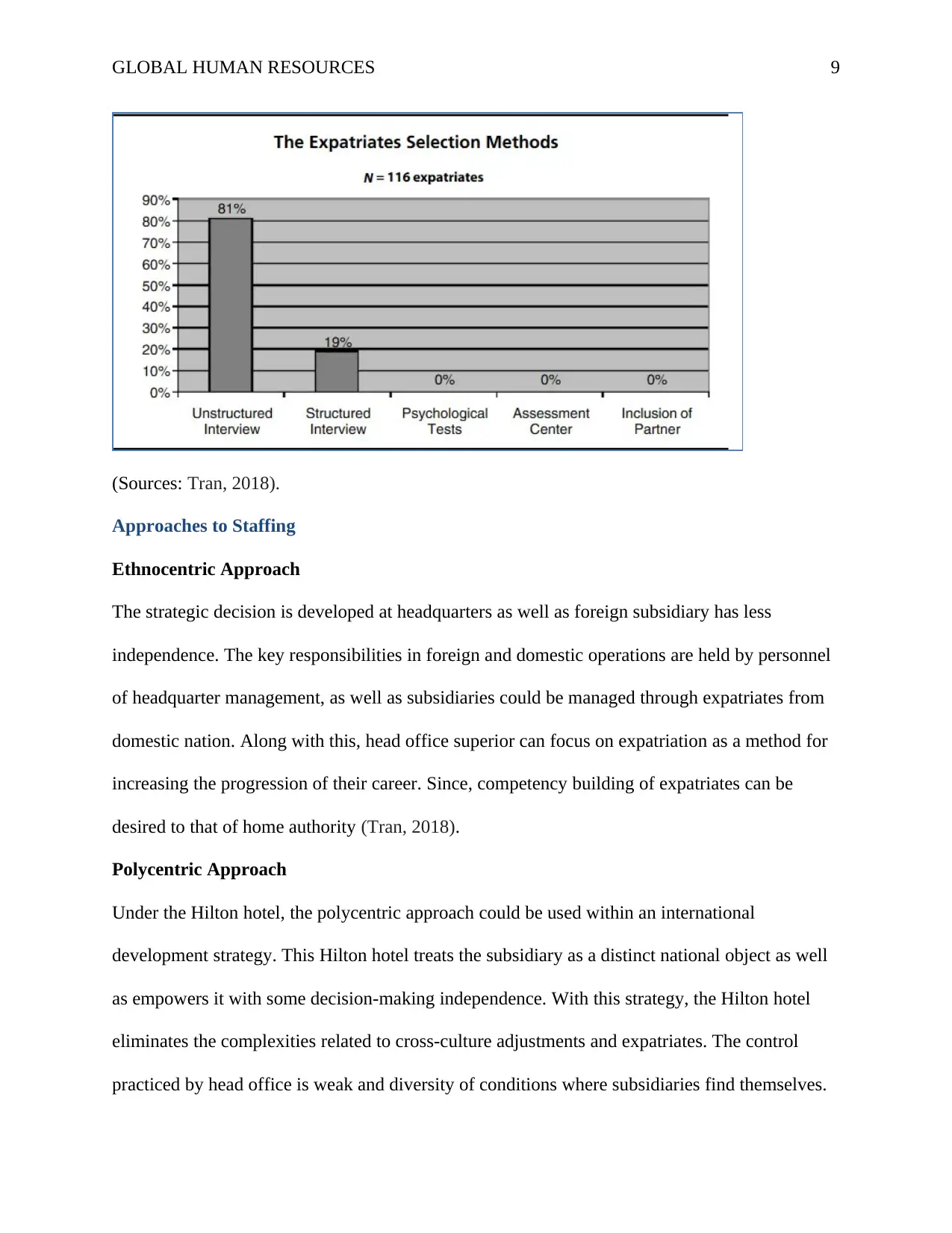
GLOBAL HUMAN RESOURCES 9
(Sources: Tran, 2018).
Approaches to Staffing
Ethnocentric Approach
The strategic decision is developed at headquarters as well as foreign subsidiary has less
independence. The key responsibilities in foreign and domestic operations are held by personnel
of headquarter management, as well as subsidiaries could be managed through expatriates from
domestic nation. Along with this, head office superior can focus on expatriation as a method for
increasing the progression of their career. Since, competency building of expatriates can be
desired to that of home authority (Tran, 2018).
Polycentric Approach
Under the Hilton hotel, the polycentric approach could be used within an international
development strategy. This Hilton hotel treats the subsidiary as a distinct national object as well
as empowers it with some decision-making independence. With this strategy, the Hilton hotel
eliminates the complexities related to cross-culture adjustments and expatriates. The control
practiced by head office is weak and diversity of conditions where subsidiaries find themselves.
(Sources: Tran, 2018).
Approaches to Staffing
Ethnocentric Approach
The strategic decision is developed at headquarters as well as foreign subsidiary has less
independence. The key responsibilities in foreign and domestic operations are held by personnel
of headquarter management, as well as subsidiaries could be managed through expatriates from
domestic nation. Along with this, head office superior can focus on expatriation as a method for
increasing the progression of their career. Since, competency building of expatriates can be
desired to that of home authority (Tran, 2018).
Polycentric Approach
Under the Hilton hotel, the polycentric approach could be used within an international
development strategy. This Hilton hotel treats the subsidiary as a distinct national object as well
as empowers it with some decision-making independence. With this strategy, the Hilton hotel
eliminates the complexities related to cross-culture adjustments and expatriates. The control
practiced by head office is weak and diversity of conditions where subsidiaries find themselves.
⊘ This is a preview!⊘
Do you want full access?
Subscribe today to unlock all pages.

Trusted by 1+ million students worldwide
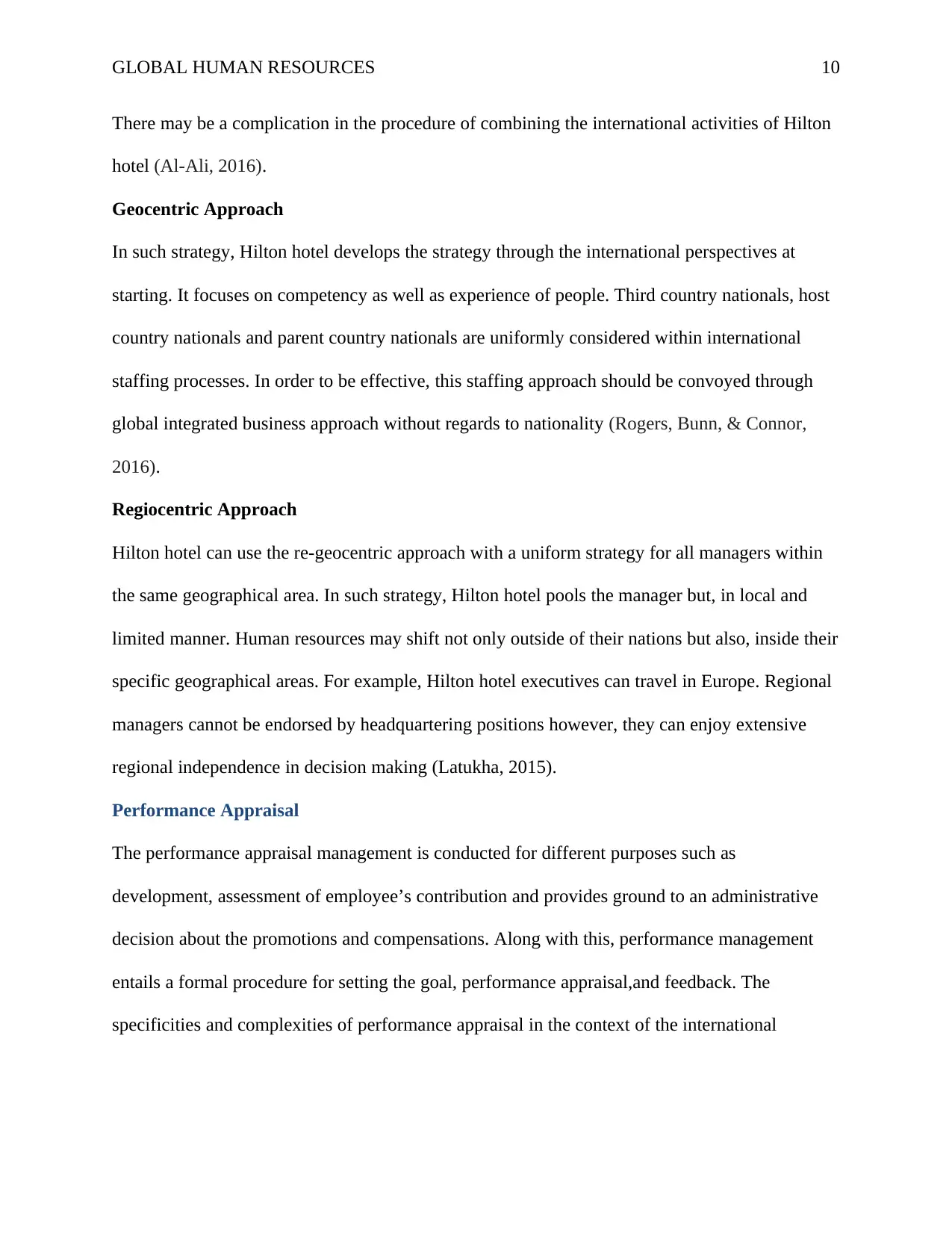
GLOBAL HUMAN RESOURCES 10
There may be a complication in the procedure of combining the international activities of Hilton
hotel (Al-Ali, 2016).
Geocentric Approach
In such strategy, Hilton hotel develops the strategy through the international perspectives at
starting. It focuses on competency as well as experience of people. Third country nationals, host
country nationals and parent country nationals are uniformly considered within international
staffing processes. In order to be effective, this staffing approach should be convoyed through
global integrated business approach without regards to nationality (Rogers, Bunn, & Connor,
2016).
Regiocentric Approach
Hilton hotel can use the re-geocentric approach with a uniform strategy for all managers within
the same geographical area. In such strategy, Hilton hotel pools the manager but, in local and
limited manner. Human resources may shift not only outside of their nations but also, inside their
specific geographical areas. For example, Hilton hotel executives can travel in Europe. Regional
managers cannot be endorsed by headquartering positions however, they can enjoy extensive
regional independence in decision making (Latukha, 2015).
Performance Appraisal
The performance appraisal management is conducted for different purposes such as
development, assessment of employee’s contribution and provides ground to an administrative
decision about the promotions and compensations. Along with this, performance management
entails a formal procedure for setting the goal, performance appraisal,and feedback. The
specificities and complexities of performance appraisal in the context of the international
There may be a complication in the procedure of combining the international activities of Hilton
hotel (Al-Ali, 2016).
Geocentric Approach
In such strategy, Hilton hotel develops the strategy through the international perspectives at
starting. It focuses on competency as well as experience of people. Third country nationals, host
country nationals and parent country nationals are uniformly considered within international
staffing processes. In order to be effective, this staffing approach should be convoyed through
global integrated business approach without regards to nationality (Rogers, Bunn, & Connor,
2016).
Regiocentric Approach
Hilton hotel can use the re-geocentric approach with a uniform strategy for all managers within
the same geographical area. In such strategy, Hilton hotel pools the manager but, in local and
limited manner. Human resources may shift not only outside of their nations but also, inside their
specific geographical areas. For example, Hilton hotel executives can travel in Europe. Regional
managers cannot be endorsed by headquartering positions however, they can enjoy extensive
regional independence in decision making (Latukha, 2015).
Performance Appraisal
The performance appraisal management is conducted for different purposes such as
development, assessment of employee’s contribution and provides ground to an administrative
decision about the promotions and compensations. Along with this, performance management
entails a formal procedure for setting the goal, performance appraisal,and feedback. The
specificities and complexities of performance appraisal in the context of the international
Paraphrase This Document
Need a fresh take? Get an instant paraphrase of this document with our AI Paraphraser
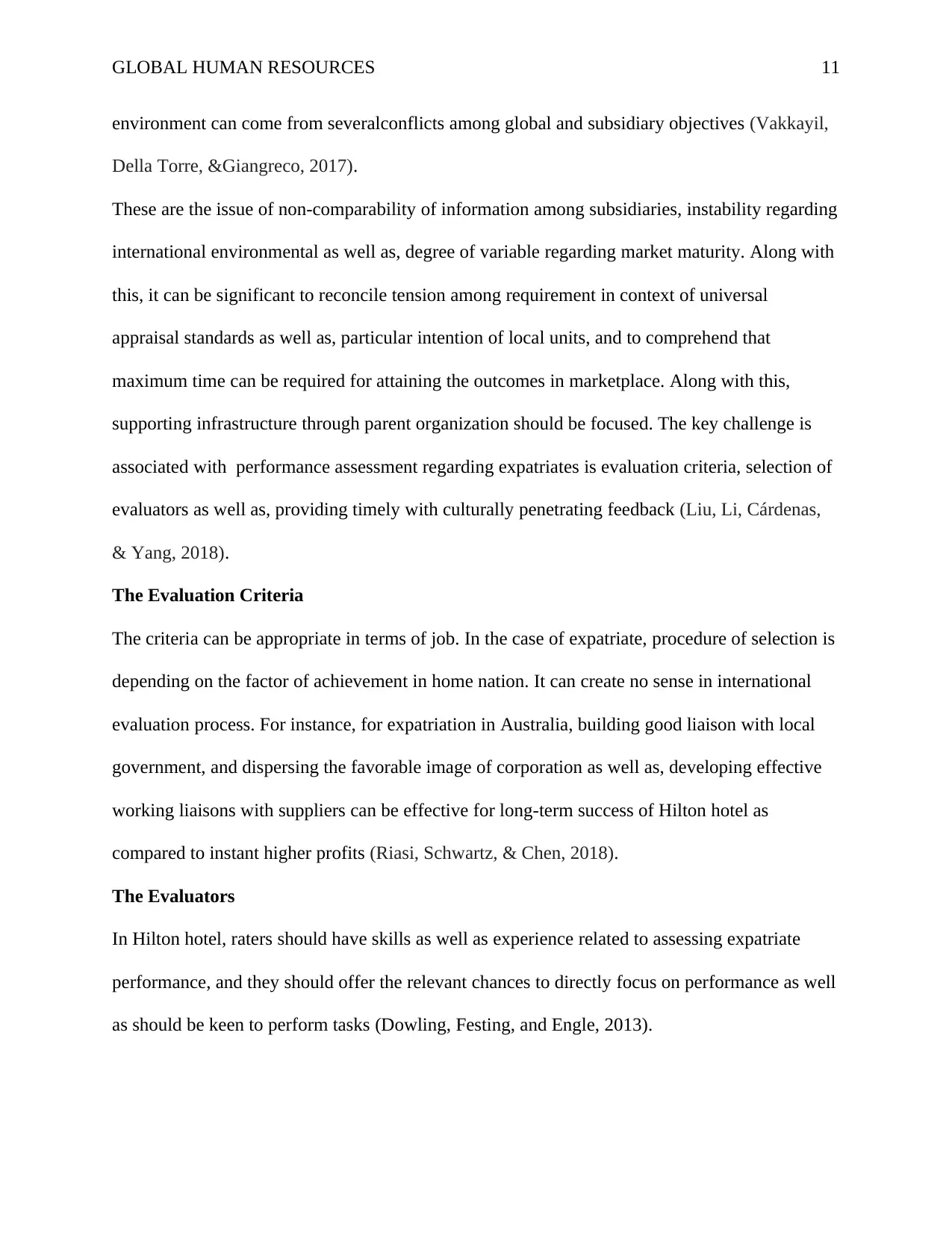
GLOBAL HUMAN RESOURCES 11
environment can come from severalconflicts among global and subsidiary objectives (Vakkayil,
Della Torre, &Giangreco, 2017).
These are the issue of non-comparability of information among subsidiaries, instability regarding
international environmental as well as, degree of variable regarding market maturity. Along with
this, it can be significant to reconcile tension among requirement in context of universal
appraisal standards as well as, particular intention of local units, and to comprehend that
maximum time can be required for attaining the outcomes in marketplace. Along with this,
supporting infrastructure through parent organization should be focused. The key challenge is
associated with performance assessment regarding expatriates is evaluation criteria, selection of
evaluators as well as, providing timely with culturally penetrating feedback (Liu, Li, Cárdenas,
& Yang, 2018).
The Evaluation Criteria
The criteria can be appropriate in terms of job. In the case of expatriate, procedure of selection is
depending on the factor of achievement in home nation. It can create no sense in international
evaluation process. For instance, for expatriation in Australia, building good liaison with local
government, and dispersing the favorable image of corporation as well as, developing effective
working liaisons with suppliers can be effective for long-term success of Hilton hotel as
compared to instant higher profits (Riasi, Schwartz, & Chen, 2018).
The Evaluators
In Hilton hotel, raters should have skills as well as experience related to assessing expatriate
performance, and they should offer the relevant chances to directly focus on performance as well
as should be keen to perform tasks (Dowling, Festing, and Engle, 2013).
environment can come from severalconflicts among global and subsidiary objectives (Vakkayil,
Della Torre, &Giangreco, 2017).
These are the issue of non-comparability of information among subsidiaries, instability regarding
international environmental as well as, degree of variable regarding market maturity. Along with
this, it can be significant to reconcile tension among requirement in context of universal
appraisal standards as well as, particular intention of local units, and to comprehend that
maximum time can be required for attaining the outcomes in marketplace. Along with this,
supporting infrastructure through parent organization should be focused. The key challenge is
associated with performance assessment regarding expatriates is evaluation criteria, selection of
evaluators as well as, providing timely with culturally penetrating feedback (Liu, Li, Cárdenas,
& Yang, 2018).
The Evaluation Criteria
The criteria can be appropriate in terms of job. In the case of expatriate, procedure of selection is
depending on the factor of achievement in home nation. It can create no sense in international
evaluation process. For instance, for expatriation in Australia, building good liaison with local
government, and dispersing the favorable image of corporation as well as, developing effective
working liaisons with suppliers can be effective for long-term success of Hilton hotel as
compared to instant higher profits (Riasi, Schwartz, & Chen, 2018).
The Evaluators
In Hilton hotel, raters should have skills as well as experience related to assessing expatriate
performance, and they should offer the relevant chances to directly focus on performance as well
as should be keen to perform tasks (Dowling, Festing, and Engle, 2013).
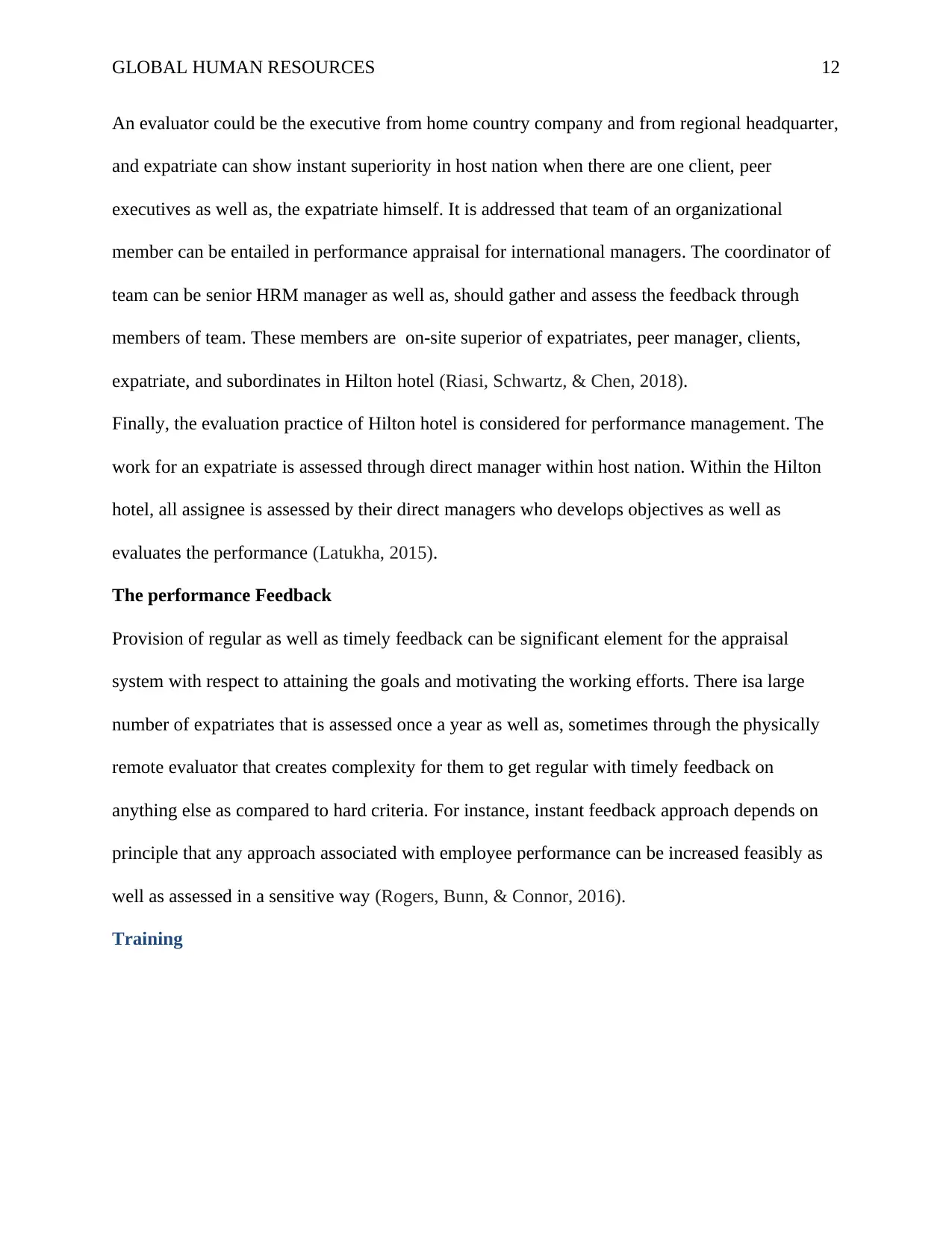
GLOBAL HUMAN RESOURCES 12
An evaluator could be the executive from home country company and from regional headquarter,
and expatriate can show instant superiority in host nation when there are one client, peer
executives as well as, the expatriate himself. It is addressed that team of an organizational
member can be entailed in performance appraisal for international managers. The coordinator of
team can be senior HRM manager as well as, should gather and assess the feedback through
members of team. These members are on-site superior of expatriates, peer manager, clients,
expatriate, and subordinates in Hilton hotel (Riasi, Schwartz, & Chen, 2018).
Finally, the evaluation practice of Hilton hotel is considered for performance management. The
work for an expatriate is assessed through direct manager within host nation. Within the Hilton
hotel, all assignee is assessed by their direct managers who develops objectives as well as
evaluates the performance (Latukha, 2015).
The performance Feedback
Provision of regular as well as timely feedback can be significant element for the appraisal
system with respect to attaining the goals and motivating the working efforts. There isa large
number of expatriates that is assessed once a year as well as, sometimes through the physically
remote evaluator that creates complexity for them to get regular with timely feedback on
anything else as compared to hard criteria. For instance, instant feedback approach depends on
principle that any approach associated with employee performance can be increased feasibly as
well as assessed in a sensitive way (Rogers, Bunn, & Connor, 2016).
Training
An evaluator could be the executive from home country company and from regional headquarter,
and expatriate can show instant superiority in host nation when there are one client, peer
executives as well as, the expatriate himself. It is addressed that team of an organizational
member can be entailed in performance appraisal for international managers. The coordinator of
team can be senior HRM manager as well as, should gather and assess the feedback through
members of team. These members are on-site superior of expatriates, peer manager, clients,
expatriate, and subordinates in Hilton hotel (Riasi, Schwartz, & Chen, 2018).
Finally, the evaluation practice of Hilton hotel is considered for performance management. The
work for an expatriate is assessed through direct manager within host nation. Within the Hilton
hotel, all assignee is assessed by their direct managers who develops objectives as well as
evaluates the performance (Latukha, 2015).
The performance Feedback
Provision of regular as well as timely feedback can be significant element for the appraisal
system with respect to attaining the goals and motivating the working efforts. There isa large
number of expatriates that is assessed once a year as well as, sometimes through the physically
remote evaluator that creates complexity for them to get regular with timely feedback on
anything else as compared to hard criteria. For instance, instant feedback approach depends on
principle that any approach associated with employee performance can be increased feasibly as
well as assessed in a sensitive way (Rogers, Bunn, & Connor, 2016).
Training
⊘ This is a preview!⊘
Do you want full access?
Subscribe today to unlock all pages.

Trusted by 1+ million students worldwide
1 out of 20
Related Documents
Your All-in-One AI-Powered Toolkit for Academic Success.
+13062052269
info@desklib.com
Available 24*7 on WhatsApp / Email
![[object Object]](/_next/static/media/star-bottom.7253800d.svg)
Unlock your academic potential
Copyright © 2020–2026 A2Z Services. All Rights Reserved. Developed and managed by ZUCOL.





